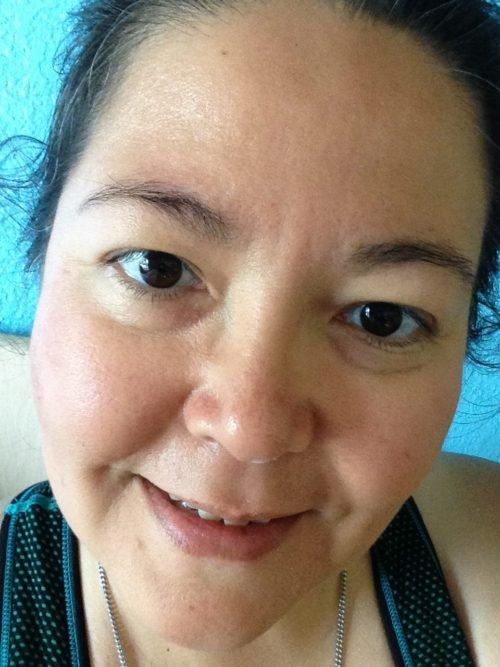Sometimes a smile is genuine. It flows from deep within to light up your face. Sometimes the smile is pained as if to say, "Please don't worry about me. I'm okay." For me, I know those smiles because I experience life, as do you. But there's one more smile that you may not be aware of - the smile of an autistic person trying to assimilate to the world around them. I know this smile very well. It's well-rehearsed. It appears genuine on the outside. No one knows the mechanics...or the effort it takes to act "normal", play nice with others in public situations, and think about all the social graces necessary to be accepted and received - instead of scorned or bullied.

Observer of humans
When I was a child, we didn't have the phrase Asperger's Syndrome. Sadly, my generation was on the tail end of committing people with neurological disorders and birth defects to institutions. People with Autism, Cerebral Palsy, Down Syndrome, to name a few, suffered terribly in places like Letchworth Village, which closed its doors forever in 1996, and Willowbrook State School, which closed it's doors within a year of Geraldo Rivera's eye-opening investigative report in 1972.
But I digress: As a high-functioning autistic, I was assessed as an adult, thankfully, blessedly never knowing the horrors of an institution. And though I'm often a mess on the inside, it was a long, hard path to appear normal on the outside... A major part of that is because I learned social cues by observing, mimicking, and practicing to be a human.
While I have very strong opinions about how we, as a whole, are failing people with mental health issues, I can do my part to help inform through my perspective - how my mind works. That being said, inclusivity does not mean full-immersion. NTs (neuro-typical, or neurologically typical) flood the psychology field and peddle their "cures" and systems.
It's taken me a lifetime of learning to make the general public believe I'm cured. A lifetime of practice. A very small handful of understanding friends. A will to learn how to play in the sun instead of hiding in the shadows.
Facial expressions are universal
Psychologists may debate whether all facial expressions are universal, but the majority agrees that at least three withstand cultural barriers: happiness, sadness, and disgust. In addition to that, I believe there are many universal languages that vanquish age, race, color, culture, and even disabilities. One of them is the language of a smile.
Normally I don't cite TV shows, but Lie To Me was an amazing show about a deceptions expert who read micro-expressions and body language to determine if a person was telling the truth. It resonated with me on a very deep level. To objectively observe people, you get a "vibe" from them. Without that vibe, how might you approach a person, talk to them and feel confident about your own actions? Think about it.
How a smile can change a moment
I have a very clear memory of my mother yelling at us kids. I don't remember what the heck she was so mad at, but she was on a warpath and the four of us kids were probably a moment away from getting our butts whooped.
The phone rang, and to my amazement, mom picked up the phone, smiled and very sweetly said, "Hello?"
It was a revelation to me. How did she go from hollering at us kids to being sweet in a single moment?
In that moment I knew a smile could change a moment. In my youth, I experimented and found out very quickly that a smile can be heard over the phone. It translated into: I'm warm, approachable...nice. I care.
Whether I really cared was neither here nor there, but I finally understood that the beneficiary of the smile was put at ease. Speaking to people became much easier with the introduction of a smile. This knowledge changed my life.
The next lesson was learning how to smile when I didn't feel like smiling. I mean, of course I smile when I'm happy, but most of the time I have resting bitch face and people always had the impression that I was angry about something.
The mechanics of a smile
Practice makes perfect.

No...not that scary!
Without actually knowing how to smile without feeling joy, you can see an example of how scary the first attempts were in this recreation. In my head I'm thinking: "If I say 'cheese' it's all good." Well... For a short while I truly was dubbed 'the creepy kid'.
Then I learned the mechanics of controlling my face.
- Relax eyebrows
- Crinkle eyes just a tiny bit
- Smile with mouth closed to push up cheeks
- Drop jaw just a little
- Show just a smidgen of teeth
- Tilt head

Practice makes perfect
Working in retail forced me to practice my approachable smile a lot. The more I did it, the less I had to think about the mechanics of adjusting my facial muscles. And like anything practiced enough, it eventually becomes more natural.
Funny story: When my husband and I were operating a deli, we literally spent 14-16 hours a day, seven days a week, working our tails off and presenting ourselves to the public. We never showed our customers how tired we were or if we were having a bad day. My practiced smile served me very well. In fact, we've been closed for several years now, and I still get messages about how much we're missed.
There was this one day though... I felt my face ache. Why? I thought. I realized that my face was stuck in smile mode. It was the strangest feeling because like any overworked muscle, I could feel the quivering burn in my cheeks. Oh crap! I forgot to relax my face. I literally had to close my eyes and force the muscles in my face to relax. Seriously, why use the energy to smile if there aren't any customers in the building, right?
Final thoughts
So that's it. One tiny knowledge bomb about how this Aspie figured out how to smile on cue because she wanted to fit in. It may sound ridiculous for those who can paste on a smile without thinking about it, but as a person on the autism scale, there are so many things in the world emitting cues, trying to learn them and figure out where we belong and how we contribute in the world is quite exhausting. The single-most valuable tool in my arsenal of assimilation was perfecting the approachable, perfect smile. So far, I've got just about everyone fooled.
If you found my article helpful, kindly vote up and leave me a message!

Meredith Loughran blogs at ScribblingBandits.com | Follow her on Twitter & SnapChat or LinkedIn
